|
The Ubud Writers and Readers Festival keeps growing from strength to strength, but this year’s event was especially important for local writers and readers as we had our very own panel
By TAN MAY LEE
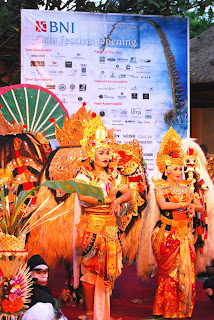 ALONGSIDE SCENIC RICE FIELDS, laidback art galleries, spas, and the remarkable Hindu temples of Ubud, Bali, bright orange banners waved at travellers all along Jalan Raya Ubud. ALONGSIDE SCENIC RICE FIELDS, laidback art galleries, spas, and the remarkable Hindu temples of Ubud, Bali, bright orange banners waved at travellers all along Jalan Raya Ubud.
There were two kinds of visitors: writers of all genres and calibre—from poets making their debuts to literary award-winning veterans—and readers of literature, and the usual Mat Salleh tourists looking for the exotic.
I don’t know about the usual tourists, but I’m quite sure I can speak for the writing and reading type when I say that we had rather large smiles on our faces as we did what we had travelled to this town to do: appreciate literature in all its many forms.
The Ubud Writers and Readers Festival is one of the world’s top six literary festivals, according to the British Harper’s Bazaar magazine.
Janet De Neefe founded this festival after the infamous terrorist bombing of Bali in 2002, which placed the popular tourist destination on high-level alert for terrorism, and which decimated its tourism industry for several years.
“I realised that I had to do something to help the people of Bali because nobody else would,” De Neefe said in an interview with the local Quill magazine last month.
“I started to think about events that would bring people back to Bali, and since I had been invited to a few literary festivals as a writer, I figured that would be the thing,” De Neefe said.
The result is a festival that fuses the universal appeal of good storytelling with the restoration of Bali as a tourist destination.
 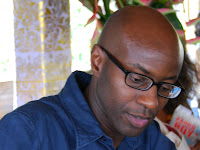 Located just an hour’s drive away from Denpasar’s Ngurah Rai International Airport, Ubud is the other half of Bali’s tourism duopoly, according to Lonely Planet Indonesia. The festival scatters its different author sessions, book launches, workshops, cocktail parties, poetry slams, and even a carnival street party (albeit one whose excitement ends at a hula-hoop on fire!) all around this enchanting town. Located just an hour’s drive away from Denpasar’s Ngurah Rai International Airport, Ubud is the other half of Bali’s tourism duopoly, according to Lonely Planet Indonesia. The festival scatters its different author sessions, book launches, workshops, cocktail parties, poetry slams, and even a carnival street party (albeit one whose excitement ends at a hula-hoop on fire!) all around this enchanting town.
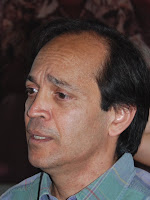 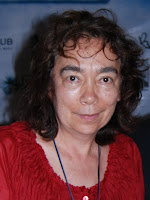 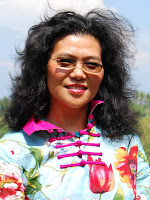 Now in its fifth year, the fest (which was on from October 14-19, 2008) had invited more than a hundred writers from 30 countries—from Segun Afolabi (A Life Elsewhere), Charlotte Bacon (A Private State), John Berendt (Midnight in the Garden of Good and Evil) and Tishani Doshi (Countries of the Body) to Vikram Seth (A Suitable Boy), Alexis Wright (Carpentaria), Geling Yan (The Banquet Bug) and Lijia Zhang (“Socialism Is Great!”: A Worker’s Memoir of the New China). Now in its fifth year, the fest (which was on from October 14-19, 2008) had invited more than a hundred writers from 30 countries—from Segun Afolabi (A Life Elsewhere), Charlotte Bacon (A Private State), John Berendt (Midnight in the Garden of Good and Evil) and Tishani Doshi (Countries of the Body) to Vikram Seth (A Suitable Boy), Alexis Wright (Carpentaria), Geling Yan (The Banquet Bug) and Lijia Zhang (“Socialism Is Great!”: A Worker’s Memoir of the New China).
Leading writers from Indonesia particularly drawn to this year’s theme—Tri Hita Karana: God, Humanity, Nature—included names such as Popo Danes, Andrea Hirata, Butet Manurung, Dyah Merta, Gede Prama and Harry Surjadi.
For them, it was an opportunity to address concerns over issues like the devastation of their country’s indigenous environment and culture, and the unstoppable urban influx into the Indonesian archipelago.
At night, on Jalan Goutama, poets went from door to door, from cafés to pubs, to perform. Listening to the soulful performances of poets like Iyut Fitra, followed by Dino Umahuk and his guitar melodies, was an intimate encounter with lyrical, almost spiritual, messages.
Tri Hita Karana symbolises a balance between god, humanity, and nature. The intercultural dialogue that goes on at this festival hopes to educate people on the need to achieve this harmony and inspire agents of change.
This year, a panel discussion of particular interest was “Malaysians Making History,” where début novelists Preeta Samarasan (Evening Is the Whole Day, a novel about an Indian immigrant family in Ipoh in the 1980s) and Chiew-Siah Tei (Little Hut of Leaping Fishes, the first in a trilogy about a Mandarin who feels torn during East-West confrontations in China) sat on either side of award-winning Malaysian writer, Faisal Tehrani (who writes atypical and award-winning novels in Malay, such as Bila Tuhan Berbicara, which he highlighted at the festival).
The panel was a small representation of the fast-growing breed of local writers successfully making it on local, regional, and international levels.
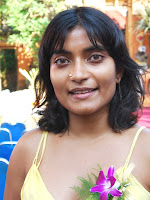 To Samarasan, the local writing scene “is just evolving.” “The fact that Tash Aw (London-based Malaysian author of the international best-seller, The Harmony Silk Factory, and locally famous for getting a multi-million ringgit advance for his début novel) did it ... people are beginning to see that they can become writers as well.” To Samarasan, the local writing scene “is just evolving.” “The fact that Tash Aw (London-based Malaysian author of the international best-seller, The Harmony Silk Factory, and locally famous for getting a multi-million ringgit advance for his début novel) did it ... people are beginning to see that they can become writers as well.”
As a multicultural nation with 51 years of independence, the voice of Malaysia might still be ambiguous to outsiders—as Samarasan rightly noted, “It takes some time to define national identity,” stating how India-born, Britain-based author Salman Rushdie’s Booker Prize-winning Midnight’s Children led to the development of Indian literature over 40 years.
Tei had this to share: “For a Chinese, (writing) was unthinkable because you can’t ‘eat’ books. I had to go down the path of many Chinese in Malaysia: I finished school and university, and I got a job and paid back my parents. This is what a dutiful daughter is supposed to do ....
“Most of my family members didn’t get a proper education so they couldn’t understand why I loved writing.”
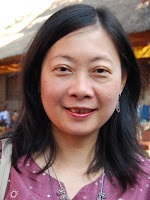 Little Hut of Leaping Fishes, interestingly, is set in China and depicts the experiences of migrants who made the decision to set sail to Malaya in the 19th century. Little Hut of Leaping Fishes, interestingly, is set in China and depicts the experiences of migrants who made the decision to set sail to Malaya in the 19th century.
At another discussion entitled “A Long Way from Home,” Tei said how her writing could be an umbilical cord to her Mother country: “I wanted to write a book about why people left China during that time because my great-grandparents were among those who immigrated to Malaya, and that’s how I became a Malaysian Chinese, not China-Chinese.”
Faisal Tehrani, who has been writing stories and poems for over 10 years now, recounted an amusing exchange with his parents: “My father’s a radiologist, my mother’s a biochemist, so when I wanted to be a writer, they said, ‘Can you write medical books?’”
He felt that, to many people around the world, Malaysians were still considered “second class” when it came to many things, including literature. That, however, did not deter him from writing, and his multiple awards (both local and international) and being the most accomplished Malay author prove that there is a demand for good novels in Malay.
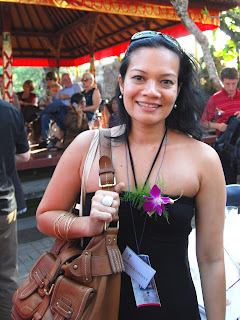 The other Malaysians who graced the festival were Sharmini Flint, who recently signed a three-book deal for her crime fiction with British publishers Little, Brown and who launched her latest novel for children, The Seeds of Time, at Anhera Hotel; and distinguished local poet Bernice Chauly, who performed pieces from her latest anthology, The Book of Sins, a moving collection of poetry and prose that captures the emotional conflicts of women. The other Malaysians who graced the festival were Sharmini Flint, who recently signed a three-book deal for her crime fiction with British publishers Little, Brown and who launched her latest novel for children, The Seeds of Time, at Anhera Hotel; and distinguished local poet Bernice Chauly, who performed pieces from her latest anthology, The Book of Sins, a moving collection of poetry and prose that captures the emotional conflicts of women.
The Bali bombings had threatened the myriad lives of the local and foreign community twice, but the Ubud lit fest urges the spiritual healing of this (usually) gentle land by bringing back security through the peaceful gathering of people who know how to appreciate harmony through words and art in every environment.
Literature can make sense of even the echo of solemn history.
At the gala festival opening, amidst the percussive resonance of traditional Balinese dances, the Governor of Bali, Mangku Pastika, gave his blessing for the festival and noted: “One thing I would like to remind and renew: the theme of the festival is love and peace. Please don’t forget that.
“We go now with (the love and peace of) Tri Hita Karana: between human beings, the environment, and God.” Source: The Sunday Star of November 2, 2008
Add this page to your favorite Social Bookmarking websites
|














